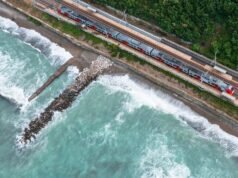A meeting of the regional working groups of the International Fund for Saving the Aral Sea (IFAS) is being held in Ashgabat, Trend reports referring to Turkmen Foreign Ministry.
The meeting is taking place with the support of the Transboundary Water Management in Central Asia Program of the German Society for International Cooperation (GIZ) and the European Union’s Central Asia Nexus Dialogue project, implemented jointly with the Regional Environmental Center for Central Asia (CAREC).
The projects “Action program to assist the countries of the Aral Sea Basin” (ASBP) and “Improvement of institutional and legal mechanisms of IFAS” are being discussed at the meeting.
Representatives from Kazakhstan, Tajikistan, Turkmenistan and Uzbekistan, the IFAS Executive Committee, the Interstate Commission for Water Coordination (ICWC) and the Interstate Commission on Sustainable Development (ICSD) are taking part in the meeting of the working groups.
There are plans to hold a coordination meeting of the IFAS Executive Committee with representatives of international organizations and potential donors in Ashgabat on Nov.27 to determine specific areas of cooperation for the implementation of the ASBP.
Turkmenistan presides over IFAS.
With the founding from Kazakhstan, Kyrgyzstan, Tajikistan, Turkmenistan and Uzbekistan, IFAS was established in the 1990s with the aim to finance joint projects and programs to save the Aral Sea and improve the environmental situation in the Aral Sea region.
IFAS obtained the observer status in the UN General Assembly in December 2008.
The special attention is paid to improving the regional action plan for environmental protection in Central Asia and accelerating the process of accession of the regional countries to the Framework Convention on Environmental Protection for Sustainable Development in Central Asia within IFAS.
Turkmenistan is affected by the problem of Aral Sea’s ecology. It is most noticeable in the country’s northern Dashoguz Region, where problems have arisen with the provision of drinking water, the fight against salinization of cultivation lands, land degradation and desertification.







